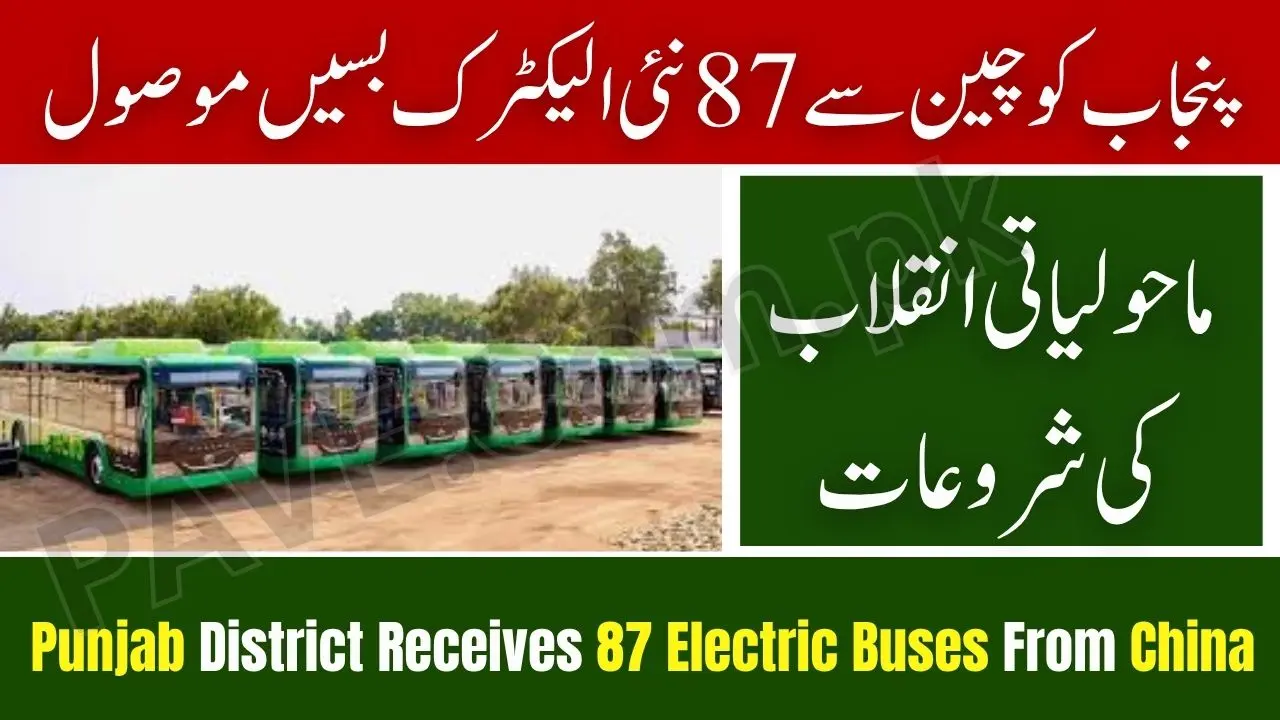Punjab District Receives 87 Electric Buses From China — Green Transport Revolution Begins
The Punjab government has officially received 87 Electric Buses From China, marking a historic milestone in Pakistan’s journey toward clean and modern urban mobility. This fleet is part of a broader plan to transform public transport in Rawalpindi and Islamabad into a more eco-friendly, affordable, and passenger-friendly system under the Green Punjab initiative.
The new electric buses will soon begin operations across four major routes, covering nearly 84 kilometers of road network between the twin cities. With features like Wi-Fi connectivity, GPS tracking, CCTV cameras, and mobile charging ports, the project promises to redefine public commuting standards in Pakistan.
Smart Public Transport for Rawalpindi & Islamabad
According to official sources, these 87 electric buses will soon be deployed by the Punjab Transport Department with technical assistance from Chinese manufacturing partners. The project represents one of the largest urban transport modernization efforts since the launch of Metrobus.
Each bus is fully electric, zero-emission, and designed to provide silent and smooth operation. The energy-efficient AC system, comfortable seating, and modern driver dashboard ensure a global-standard travel experience.
Key Features of the Buses
- Wi-Fi enabled connectivity for passengers
- GPS and live tracking through a central command center
- CCTV cameras for onboard safety
- USB charging ports for mobile devices
- Comfortable seating with disabled-friendly space
- Air-conditioned interiors to suit Punjab’s climate
Fare Policy and Free Travel for Senior Citizens
The government has introduced a passenger-friendly fare policy to encourage adoption of eco-transport.
- Standard fare: Rs 20 per ticket only
- Free travel: Senior citizens aged 60 and above
- Discounts: Students and persons with disabilities (PWDs) will receive special passes soon
This initiative aims to make daily travel both affordable and inclusive, especially for working-class commuters in Rawalpindi and Islamabad.
Check Also: 24 Electric Buses Launched in Dera Ghazi Khan 2025 – Modern, Comfortable & Pollution-Free Ride
Routes and Operational Plan
According to PML-N Rawalpindi Division President Malik Abrar Ahmed, the fleet will operate on four designated electric routes under a phased rollout plan.
Phase-Wise Route Details
| Phase | Route | Distance (km) | Key Stops |
|---|---|---|---|
| Phase 1 | Rawat → Motorway Chowk | 30 km | Rawat, Katcheri, Faizabad, I-8, Motorway Chowk |
| Phase 2 | Saddar → Islamabad Secretariat | 18 km | Saddar, Marrir Chowk, Blue Area, Secretariat |
| Phase 3 | Pirwadhai → Airport Route | 20 km | Pirwadhai, Gulzar-e-Quaid, Airport Road |
| Phase 4 | Adiala Road → Committee Chowk | 16 km | Adiala, Katcheri, Liaquat Bagh, Committee Chowk |
Each route will have charging stations, control rooms, and maintenance depots established near the terminals for uninterrupted service.
Delayed Inauguration Due to Civil Unrest
The inauguration ceremony, initially scheduled for October 15 2025, was postponed due to protests and unrest by Tehreek-i-Labbaik Pakistan (TLP) in various parts of Punjab. However, officials have confirmed that once the law-and-order situation stabilizes, the electric bus service will be inaugurated immediately.
This short delay has not affected the overall project schedule, as most buses are already parked at the Rawalpindi depot and awaiting deployment after route-testing and driver training.
Environmental Impact — A Step Toward Cleaner Punjab
The introduction of electric buses aligns with Chief Minister Maryam Nawaz’s Green Punjab Vision 2025, which focuses on reducing air pollution, cutting carbon emissions, and improving air quality in major urban centers.
Expected Environmental Benefits
- Zero tailpipe emissions, cutting CO₂ by 4,000 tons annually
- Reduction in fuel consumption by over 3 million liters per year
- Noise-free operation, improving roadside living conditions
- Health benefits from cleaner air for city residents
Punjab’s Transport Department plans to expand this initiative to Lahore, Faisalabad, Multan, and Gujranwala in later phases, turning the province into a model of sustainable transport.
Public Reactions and Future Expansion
Residents of the twin cities have welcomed the announcement enthusiastically, calling it a “game-changer for daily commuters.” Social-media posts show excitement over affordable ticket prices, comfort, and Wi-Fi availability.
Government’s Future Plans
- Expansion to Lahore’s Orange Line extension routes
- Introduction of electric feeder vans for short-distance connectivity
- Public-private partnership with Capital Smart City EV Division for local assembly
- Gradual replacement of diesel buses with e-buses across Punjab
The project’s success could also attract international climate funding through green bonds and the Asian Development Bank (ADB).
Check Also: Breaking News: Punjab Launches 1,100 Electric Taxis in Lahore Pilot Project
Economic and Job Impact
The deployment of electric buses has also created new technical and maintenance jobs for youth in the region. The Punjab Mass Transit Authority (PMTA) has trained 200+ local technicians and drivers in EV maintenance, battery management, and route monitoring systems.
In the long run, this shift from imported fuel to local charging networks will save millions in foreign exchange and strengthen the local EV ecosystem.
Comparison With Lahore Metro and Feeder Buses
| Feature | Lahore Metro Bus | Rawalpindi Electric Bus |
|---|---|---|
| Fuel Type | Diesel | 100% Electric |
| Avg Fare | Rs 30 | Rs 20 |
| Free Travel for Seniors | No | Yes |
| Wi-Fi & USB Ports | Limited | Available on All Buses |
| Emissions | High (≈ 12 t CO₂/day) | Zero |
| Noise Level | High | Low |
| Coverage Area | 27 km | 84 km |
This comparison highlights Punjab’s shift from fossil-fuel dependence to sustainable energy, in line with Pakistan’s EV Policy 2030 goals.
Challenges Ahead
While the project is promising, experts point out a few operational challenges:
- Need for adequate charging infrastructure at depots and terminals
- Electricity reliability and grid capacity in peak hours
- Driver training for advanced EV systems
- Public awareness for care and maintenance of EV assets
The Transport Department is addressing these by installing fast chargers, introducing backup solar energy units, and launching an EV awareness campaign under the PAVE EV Forum in partnership with PAVE.com.pk.
Role of PAVE and Private EV Sector
The private sector, led by PAVE Pakistan EV Forum, is playing a crucial role by supporting the assembly of electric buses, promotion of green transport, and training of EV technicians.
PAVE has already proposed a collaborative EV training hub in Rawalpindi for students and engineers to learn practical EV technologies and maintenance. This collaboration could significantly expand Pakistan’s electric-mobility workforce over the next five years.
People Also Ask about 87 Electric Buses From China:
1. How many electric buses has Punjab received from China?
Punjab has received 87 fully air-conditioned electric buses as part of its clean public-transport project for Rawalpindi and Islamabad.
2. What is the fare for the new electric buses in Punjab?
The standard fare is Rs 20 per ticket, with free rides for senior citizens aged 60 and above.
3. Which routes will the electric buses operate on?
Four routes covering 84 km in the twin cities — including Rawat to Motorway Chowk, Saddar to Secretariat, Pirwadhai to Airport Road, and Adiala to Committee Chowk.
4. When will the Punjab electric bus service be inaugurated?
The launch was postponed due to TLP unrest, but authorities have confirmed it will begin soon after normalization of the situation.
5. Are electric buses environmentally friendly?
Yes, they are zero-emission vehicles that reduce carbon dioxide and air pollution, supporting Punjab’s Green Transport Policy 2025.
Conclusion – Punjab District Receives 87 Electric Buses From China
The arrival of 87 electric buses from China marks a new chapter in Punjab’s transport revolution. Beyond offering comfort and affordability, this initiative symbolizes Pakistan’s commitment to a cleaner, greener, and more modern future.
With more expansions planned in other districts, Rawalpindi and Islamabad are set to become the model cities for electric mobility in South Asia.







